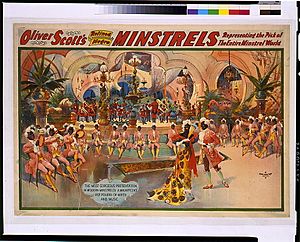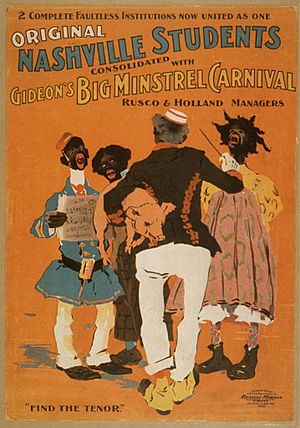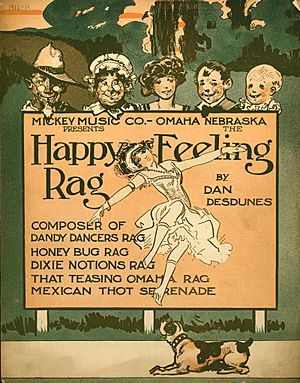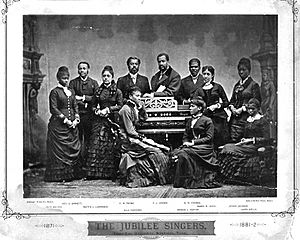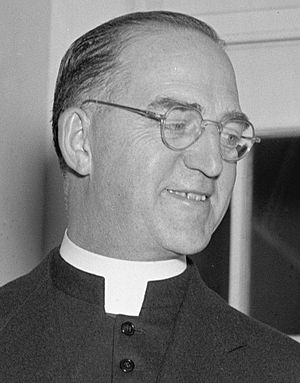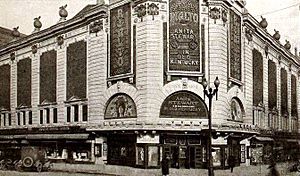Dan Desdunes facts for kids
Quick facts for kids
Daniel F. Desdunes
|
|
|---|---|
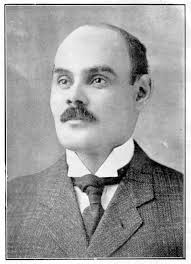 |
|
| Born | c. 1870 New Orleans, Louisiana, U.S.
|
| Died | April 24, 1929 Omaha, Nebraska, U.S.
|
| Alma mater | Straight University |
| Occupation | Musician |
| Spouse(s) | Victoria Oliver |
Daniel F. Desdunes (born around 1870 – died April 24, 1929) was an important civil rights activist and a talented musician. He lived in New Orleans and later in Omaha, Nebraska.
Daniel came from a family of people of color who were free even before the American Civil War. In 1892, he bravely tried to ride in a train car meant only for white people. This was against a Louisiana law called the 1890 Separate Car Act. This act made public transportation separate for different races. Daniel's action was a test case. A group called the Comité des Citoyens wanted to challenge this unfair law in court.
The train Daniel boarded was traveling between states. Because of this, the court decided that the state law didn't apply. Federal laws covered trains that crossed state lines. Soon after, another member of the Comité des Citoyens, Homer Plessy, tried a similar test on a train that stayed within Louisiana. He was arrested. This case became famous as Plessy v. Ferguson. In 1896, the U.S. Supreme Court ruled that "separate but equal" facilities were allowed. This decision made segregation legal for many years.
While these legal battles were happening, Desdunes became a successful musician. He led bands, orchestras, and minstrel shows. He played many instruments, including the coronet, violin, baritone horn, and trombone. He was known for playing many styles, like minstrel, ragtime, jazz, gospel, classical, and marching music. He performed with famous leaders like P. G. Lowery and Harry Prampin.
In 1904, Desdunes moved to Omaha, Nebraska. Many African Americans from the South moved there during the Great Migration. His band became very popular in Omaha. He also led the Boys Town Band at Father Flanagan's Boys Town, a famous home for children. People in Omaha called him the "father of negro musicians of Omaha."
Contents
Early Life and Family
Daniel Desdunes was born around 1870. His parents were Rodolphe Lucien Desdunes and Mathilde (Cheval). He had several siblings. His father, Rodolphe, was also a civil rights activist, writer, and poet.
Daniel's half-sister, Mary Celine, was born in 1879. She later became known as Mamie Desdunes. Mamie was a blues pianist. The famous jazz musician Jelly Roll Morton learned a song from her that he later recorded.
Daniel went to public schools in New Orleans. He also attended Straight University, which was a college mainly for Black students. After college, he worked as a house painter and music teacher. In 1895, Daniel married Victoria Oliver. They had a son named Clarence in 1896. Sadly, Victoria passed away soon after. Daniel later married Madia Dodd. He lived in New Orleans for most of the 1890s. In 1904, he moved to Omaha, Nebraska, where he lived for the rest of his life.
Fighting for Civil Rights
In 1890, Louisiana passed the Separate Car Act. This law made public transportation segregated. Daniel's father, Rodolphe Desdunes, and other leaders formed the Comité des Citoyens. This group worked to organize civil rights efforts for Black people. Rodolphe asked his son, Daniel, to challenge the new law.
On February 24, 1892, Daniel boarded a train going to Mobile, Alabama. He was arrested in New Orleans. However, the judge ruled that the Separate Car Act could not be used for trains traveling between states. This was because only the federal government could control travel between states.
The Comité des Citoyens decided to challenge the law again. This time, they focused on travel within the state. Homer Plessy volunteered to break the law. His case, Plessy vs. Ferguson, went all the way to the U.S. Supreme Court. In 1896, the court ruled that states could have "separate but equal" facilities. This decision allowed segregation to continue for many years.
Music Career in New Orleans
In the early 1890s, Daniel Desdunes often performed with cornet player Sylvester Coustaut. Desdunes played violin and baritone horn in their band, the Coustaut-Desdunes Band. They played popular dance music of the time. Later, Desdunes joined other musical groups, including the Onward Brass Band. He also performed in traveling minstrel shows starting in 1894.
In the late 1890s, Desdunes performed with P. G. Lowery in a group called the Nashville Students. By 1897, Desdunes was leading the orchestra within the group. Lowery led the band. They had many talented soloists and musicians.
Later, cornet player Harry Prampin took over as the band leader. Desdunes sometimes played second trombone in Prampin's band. His orchestra played classical music, including pieces from operas. Other important musicians joined the group over the next few years.
The Nashville Students toured all over the country. Desdunes helped arrange music for the group's comedians. He also played first alto in another group called Fred W. Simpson's Oliver Scott Refined Negro Minstrels.
In 1899, Desdunes also created a comedy show with Skinner Harris. Desdunes played the "straight man" in their act. Another member of the Nashville Students, L. E. Gideon, formed his own minstrel show. Desdunes led the orchestra for Gideon's show. Soon, the Nashville Students and Gideon's group merged. They became known as Gideon's Big Minstrel Carnival. Desdunes was highly praised for his musical skills. He continued touring with these groups until 1901.
During this time, Desdunes also started writing songs. Some of his songs included "Gim Me Mine" and "I'm Certainly Feeling Right Today." In 1904, Desdunes toured with a new musical comedy he co-wrote. After this tour, he decided to settle in Omaha, Nebraska. He had become interested in Omaha during a previous visit.
Music and Life in Omaha
In Omaha, Daniel Desdunes continued his music career. He quickly formed a new band. He also managed a billiard room and opened a dancing club. Desdunes was an active member and officer of the Colored Commercial Club in Omaha.
In 1908, his band gained national attention. They competed in a "battle of the bands" in Chicago. Desdunes' performance was a favorite with the crowd. He continued to arrange and write music in Omaha. He put on a special performance called "Forty Years of Freedom" to celebrate Emancipation. His compositions from this time were mostly ragtime music. His song "Happy Feeling Rag" was published in 1912.
Starting in 1910, Desdunes traveled with the Omaha Chamber of Commerce on their yearly trade tours. These tours promoted Omaha businesses across the Midwest. He participated in these tours for over 20 years. His band often performed in parades in Omaha.
In 1928, after a parade, Desdunes was invited to meet a businessman at an Omaha hotel. When he arrived, he was not allowed to use the main elevator. Desdunes politely refused to use the freight elevator. This event became a civil rights issue in Omaha. Leaders from the NAACP brought his case to public attention.
Desdunes was one of the first bandleaders in Omaha to call his music "jazz." In 1917, an advertisement for a charity ball mentioned "Desdunes’ Jazz Orchestra." This was around the same time the first jazz record was released.
Desdunes' music was very popular with soldiers during World War I. His band in Omaha had at least 25 members. Many talented musicians played with him. Jeff Smith, a famous cornet soloist, joined his band in 1918.
After the war, Desdunes was invited to teach music at Father Flanagan's Boys Town. This was a home for boys who needed help. In 1921, Desdunes put on a minstrel show with 25 boys from Boys Town. He wrote the script and music, choreographed the dances, and directed the whole show. Between 1922 and 1927, the Boys Town band toured the country. They raised money and entertained audiences. Desdunes was known for helping young musicians. He never ignored a struggling musician's hopes and dreams.
Desdunes' Knights of Pythias band continued to play throughout the 1920s. They were also known as "Dan Desdunes' First Regimental Band." In 1924, a magazine called Billboard reported that his band was very popular. They were especially known for playing "Listen to the Lambs." The band also performed comedy shows at Omaha's Rialto Theater.
In 1925, Desdunes was asked to play music for two lectures by the Ku Klux Klan. After talking with friends, Desdunes announced that he would not play for them.
Death and Legacy
Daniel Desdunes caught a cold while performing with the Boys Town Band on April 20, 1929. He sadly died of spinal meningitis on April 24, 1929. His funeral was held at St. Philip's Episcopal Church. He was buried at Forest Lawn Cemetery. After his death, other musicians took over leadership of his band.
Historians say that Daniel Desdunes' New Orleans band was known for "swinging the beat" as early as 1892. This "swinging" style is a key part of jazz music. This suggests that Desdunes was one of the first musicians in history to play jazz. He also helped create a culture of teaching and supporting musicians in Omaha's African American community. He influenced many artists who came after him.
Images for kids
Elsewhere online
 | Kyle Baker |
 | Joseph Yoakum |
 | Laura Wheeler Waring |
 | Henry Ossawa Tanner |


